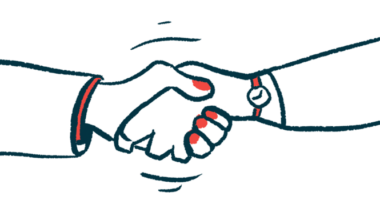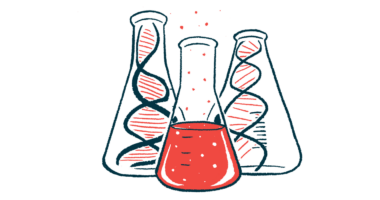MCARH109, CAR T-cell Therapy for Advanced MM, Shows Potential
New Phase 1 trial, now enrolling, testing MCARH109 with separate therapy

A new investigational CAR T-cell therapy, called MCARH109, demonstrated an ability to shrink or eliminate the amount of cancer in patients with relapsed or refractory multiple myeloma, according to results from a dose-escalation Phase 1 trial.
Safety findings showed the treatment at its highest dose was not safe for further testing, with serious inflammatory and neurological adverse events reported in some patients. But its three lower doses — which also showed clinical efficacy — were deemed safe.
A separate Phase 1 study that includes MCARH109 is now underway and enrolling.
Trial results were described in the study “GPRC5D-Targeted CAR T Cells for Myeloma,” published in the New England Journal of Medicine.
“We are thrilled that the positive … study results were published in such a prestigious journal,” Cheng Liu, PhD, president and CEO at Eureka Therapeutics, which is developing the therapy, said in a company press release. “The results reaffirm our commitment to developing the next generation of safer and more effective T-cell therapies to treat patients with cancer.”
The separate Phase 1 trial (NCT05431608) is now investigating the safety of combining MCARH109 with another type of CAR T-cell therapy, called MCARH125, or MCARH125 alone in relapsed or refractory multiple myeloma patients. This trial, also dose-escalating, is recruiting up to 24 adults at the Memorial Sloan Kettering Cancer Center (MSK) in New York.
Tested doses will range from 50 million CAR T-cells to 150 million for each therapy.
Partial clinical response seen in 71% of trial patients
Chimeric antigen receptor (CAR) T-cell therapy works to genetically engineer components of the immune system, called T-cells, to recognize and attack cancer cells. Briefly, T-cells are isolated from a patient’s blood and engineered in the lab to express a lab-made receptor, or CAR, on their surface. This CAR is designed to recognize and attack a specific protein on cancer cells, leading to their destruction. After a course of chemotherapy to wipe out the person’s immune system and make room for the modified cells, the therapy is infused to the patient.
Most CAR T-cell therapies developed for multiple myeloma, including Abecma (idecabtagene vicleucel) and Carvykti (ciltacabtagene autoleucel), target a cancer protein called B-cell maturation antigen (BCMA).
“While BCMA-targeted therapies have shown remarkable promise, relapses are common and most patients will ultimately need additional treatment options,” Sham Mailankody, MD, one of the study’s lead researchers and an MSK oncologist, said in an MSK press release.
MCARH109 instead targets the G protein–coupled receptor, class C, group 5, member D (GPRC5D). While the exact role of this protein isn’t known, MSK researchers found that the protein exists at high levels on the surface of myeloma cells, and that in mouse myeloma models, GPRC5D-targeted CAR T-cells had anti-tumor effects.
After together developing the GPRC5D binding protein, Eureka and MSK licensed it in 2016 to Juno Therapeutics, now a Bristol Myers Squibb subsidiary, for use in CAR T-cell therapies.
The open-label Phase 1 dose-escalation trial (NCT04555551), launched in 2020, was conducted at MSK and included 17 adults with relapsed or refractory multiple myeloma. All had measurable disease at enrollment and had previously received at least three lines of treatment, including proteasome inhibitors, immunomodulatory agents, and anti-CD38 therapies.
The trial’s primary goal was to determine MCARH109’s maximum tolerated dose among four tested doses: 25, 50, 150, or 450 million CAR T-cells.
Most patients (88%) experienced cytokine release syndrome, an inflammatory response that leads to fever, nausea, fatigue, body aches, and potentially, organ dysfunction. This symptom was mild or moderate for all patients except for one treated at the highest dose. Other common side effects included nail changes, infections, and rash.
Three of five patients in the highest dose group (450 million cells) experienced dose-limiting toxicities, including one person with severe cytokine release syndrome and signs of neurotoxicity, and two with persistent symptoms suggestive of toxicity to the cerebellum, the part of the brain involved in balance and movement.
Based on these safety findings, the maximum tolerated dose was determined to be 150 million CAR T-cells.
Clinical efficacy was examined as a secondary trial outcome. Overall, 71% of patients had at least a partial clinical response to the treatment, meaning their cancer shrank or they had fewer cancer cells in their body.
This included 58% (7 out of 12) of those treated with MCARH109 at lower and tolerable doses of up to 150 million cells. Therapeutic responses were similar among the 10 patients who had previously received a BCMA-targeted therapy and the seven who hadn’t.
Over a median follow-up of 10.1 months, six of 12 people who responded to treatment remain progression-free, two of whom had been followed for at least a year.
Robert Reinknecht was among the advanced multiple myeloma patients treated with the GPRC5D-targeted therapy in the trial.
A year later, Reinknecht is doing well and enjoying retirement. “I feel very lucky about everything. Thank God there are brilliant scientists and doctors who have been working on this. If it had happened to me 20 years ago, I don’t think I’d be alive,” Reinknecht said.
The new Phase 1 trial is evaluating the safety of MCARH109, a GPRC5D-targeted therapy, in advanced myeloma patients in combination with MCARH125 — a BCMA-targeted CAR T-cell therapy — or MCARH125 alone.
“We are continuing to explore possible combination approaches with this therapy as well as understand how resistance may develop,” Mailankody said. “Having an experimental treatment for patients just three years after a lab discovery is pretty remarkable — a clear sign that progress against multiple myeloma is picking up speed.”
Juno is also sponsoring a separate Phase 1 trial (NCT04674813) to evaluate CC-95266, another GPRC5D CAR T-cell therapy, in up to 77 people with relapsed or refractory multiple myeloma. The study is enrolling eligible adults at sites across the U.S.







